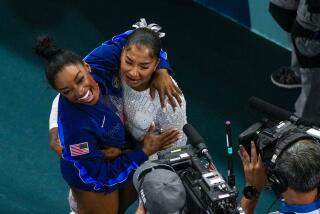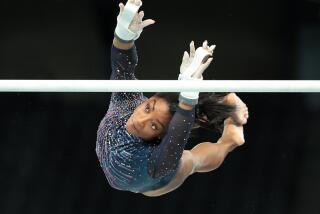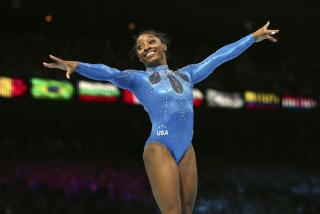Effect of Gymnastics on Girls’ Growth Debated
- Share via
WASHINGTON — Girls’ growth is not stunted by the tough exercise and diet restrictions required to be the best in gymnastics, researchers say. But some scientists say some of the young gymnasts nonetheless never will grow to their full potential height.
Two reports in sports medicine journals reviewed studies on the elite athletes. The researchers agree there is no proof that the training regimens keep the girls from growing as tall as they should.
But while one study concludes the girls eventually will grow as tall as nature intended, another warns that some may wind up shorter than they should be, for reasons that are not yet clear.
“They will reach their potential adult height, not being compromised by training,” said researcher Adam Baxter-Jones of the University of Saskatchewan.
“We both agree there is no evidence of cause-and-effect between training and reduced growth,” said researcher Dennis Caine of Western Washington University. “But in some kids, growth may be retarded, and you should follow up with those kids.”
At issue are training schedules that keep the girls exercising from 10 hours to 25 or more hours a week for events in which thinness is virtually a requirement.
The strenuous exercise burns calories, and researchers say many girls do not eat enough to replace them. The combination of many calories out and fewer calories in can disrupt hormonal cycles, delaying puberty. Some earlier research had indicated that the delay would retard the growth spurt that comes with adolescence.
The latest reports conclude that the gymnasts tend to be small because small girls can do better at their events’ quick, precise movements than can larger girls, who wind up dropping out of the sport--a process called self-selection.
Baxter-Jones and his colleague, Nicola Maffulli of Keele University School of Medicine in England, published their review in the British Journal of Sports Medicine. Caine and his four colleagues published theirs in the Clinical Journal of Sport Medicine.
The shortness of the female athletes may simply result from genetics, Baxter-Jones said. Girls in gymnastics tend to have parents who also are smaller than average, he said.
The girls tend to run late on getting their first periods, and their mothers tended to have done the same, Baxter-Jones said. The delay in sexual development lets an athlete retain the more lithe figure of childhood, with smaller breasts and narrower hips.
The girls catch up later, with sexual maturity and growth that comes later than girls in other sports, or later than girls who are not involved in a sport, Baxter-Jones said.
However, while Baxter-Jones’ article concluded that “training does not appear to affect growth and maturation,” the Caine article came to a somewhat different conclusion.
“Elite level or those gymnasts involved in heavy training regimens may be at risk for adverse effects on growth and maturation,” Caine and his colleagues said. “This effect is often but not necessarily always reversed after retirement.”
The Baxter-Jones article, with 18 citations of previous works, did not include some of the 94 studies cited in the Caine article, Caine said.
The two reviews agree diet and exercise probably don’t cause growth retardation. Both find the girls catch up later in their growth. But the Caine article reports some girls do not seem to catch up, for reasons that are unclear. And those who are shorter than 95% of girls their age should be taken to doctors for examinations, the article said.
Even if exercise and diet don’t cause growth restrictions, something else may, and the problem should not be ignored on the theory that the girl will grow out of it, Caine said.
“The catch-up growth observed during reduced training schedules or the months following retirement provides evidence that growth is affected in some instances,” the article said. “Although catch-up growth does occur, the evidence is inconclusive whether normal height is achieved.”






